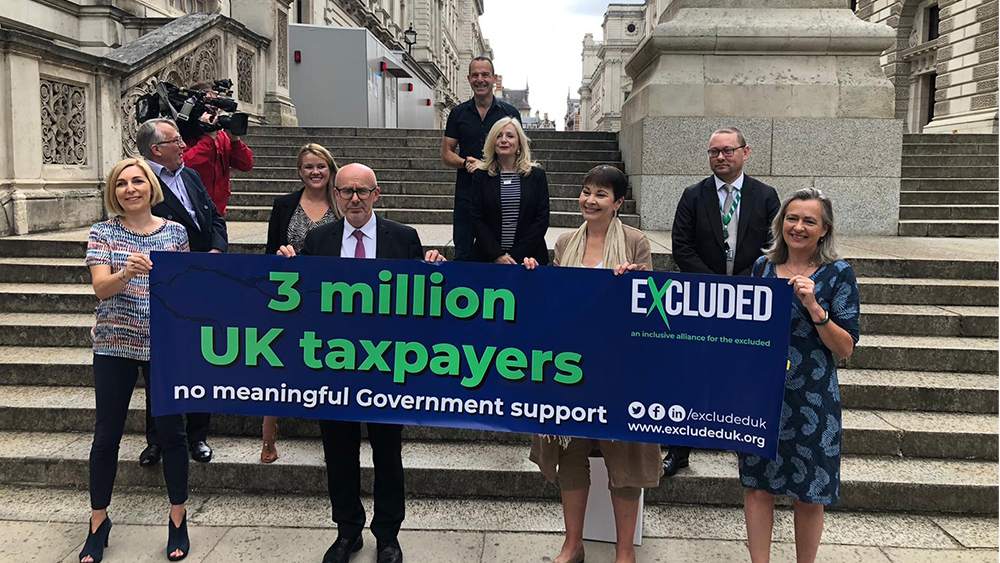Despite a number of government funds and support schemes launched in response to the Covid-19 crisis, it appears that many people have slipped through the cracks. In this article we hear from curator and subtitler Sonali Joshi, about what led her to found ExcludedUK and the work they’re now doing to raise awareness and support for those excluded from government financial support.
I began 2020 moving towards final preparations for a Japan-focused touring film exhibition project, due to launch in June as part of Aperture: Asia & Pacific Film Festival, loosely tying in with the Tokyo Olympics. While on my last festival trip before the planned launch of the project, at International Film Festival Rotterdam in late January, Covid-19 presented only the slightest palpable sense of unease as we all amassed in film theatres as well as the usual festival gatherings. A few days later I returned to Tokyo to wrap up my curatorial project, yet soon found myself unable to do much for the next four months due to the onset of the pandemic.
The birth of ExcludedUK
Seemingly living everything a few steps ahead of the UK whilst in Tokyo at this point, I knew I’d have to rethink my ‘Urban, Natural, Human’ Japanese project. After all, I was unable to collect any of the film materials to bring back to the UK, I couldn’t travel for the final research needed, and I was observing what was happening within the Japanese film exhibition sector. Sitting in a meeting at the offices of Japanese national broadcaster NHK in early March with two producers, discussing potential screenings of a Hokusai documentary in the UK, all of us socially distanced and wearing masks, it suddenly hit home. And so I hit pause.
Three weeks later, we heard Rishi Sunak’s now infamous words, ‘You have not been forgotten. We will not leave you behind. We are all in this together…’ as the SEISS scheme was announced, following the earlier announcement of the CJRS scheme. As a limited company and a partial freelancer in the film industry, it soon became evident that I was excluded from meaningful government financial support, and it didn’t take long before I found myself amid a community of many others facing the same predicament. I launched into every bit of political lobbying I could, writing to my local MP, key members of the Cabinet and their Opposition counterparts as well as other prominent MPs calling for support, my focus being very much on the creative industries. Within a few weeks, I had come together with three other small business owners, and we coalesced around the idea of forming a grassroots, volunteer-run organisation to lobby and raise awareness, while equally serving as a friendly and supportive community. And so ExcludedUK was born.

Starting out
The four of us all come from different industries, we’re in entirely different parts of the country, but the overriding factor for us all was the scale of the issue – something that went far beyond our own situations. And this diversity within our team made for an invigorating environment – I’ve never worked outside of the film industry and taking on board different ideas and approaches was surprisingly refreshing.
As the only one of four founders working in the creative industries, this naturally became my focus, alongside responsibility for policy and communications matters. Within a matter of weeks we’d built up a sizeable Facebook community (now ~18k) and Twitter following (now ~13k), forming the bedrock of our awareness raising activities. Working on projects that necessitate risk-taking and focusing on underrepresented areas of cinema (Asian, Latin American cinemas and artists’ film in particular), I’m all too aware of how tough it can be to secure press coverage, alongside ongoing challenges in audience development and marketing. ExcludedUK has been an altogether different experience, with press requests from national broadcasters, local press and specialist media coming through thick and fast, and a rapidly-growing community and burgeoning champions of the cause taking our messages out far and wide. It all came together completely organically, while the team has now grown to a small army of around 40 volunteers.
The numbers
One of the first areas of work we engaged in was data analysis, to understand the full scale of the multiple exclusions and their far-reaching impacts. We concluded that 3 million individuals and businesses are affected from every walk of life, diverse industries and professions – new starters, those in between jobs, those denied furlough, the newly self-employed and new businesses, those earning less than 50% of their income from self-employment, those with £50k+ trading profits, those on maternity, parental or adoption leave, those on PAYE freelance short-term contracts, small limited company owner-directors, businesses ineligible for grants, and a whole host of personal circumstances unfairly affecting eligibility.
However, one of the most startling findings from ExcludedUK’s first survey of ~2,500 respondents was that around 30% of respondents were from the creative industries. Before ExcludedUK came into being, I’d planned a Day for Night survey to assess the impact on those in the creative industries. Aware that so many from the arts and cultural sectors were affected, Day for Night and ExcludedUK teamed up to jointly run this survey, producing the following key findings from 770 responses:
- 79% of those affected in the creative industries are either self-employed or small limited companies
- 73% had pre-Covid earnings of less than £50k
- 67% said they had no work and none of the horizon
17% of these respondents work in the film industry.
These findings are consistent with the initial ExcludedUK survey covering all industries, which also found that 72% were on less than 20% of their pre-Covid income. And while the Government has repeatedly asserted that everyone has been helped in some way, for those excluded this is not meaningful support, while many have received no support at all. The impact goes beyond the 3 million, extending to families, and for small business owners to their employees, freelancers and sub-contractors.
Those affected can’t just ‘bounce back’ and the longer-term impacts are set to become more acute: financial hardship and debt, unemployment and failed businesses, many facing no prospect of work or having to consider changing industries, and not just a looming mental health crisis, but one that is very much upon us.
With many freelancers, sole traders and small limited companies working in the film industry, many film industry professionals have been affected – actors, filmmakers, producers, production companies, editors, scriptwriters, technical crew, curators and programmers all feature within the wider ExcludedUK community.

The road ahead
The creative industries by their very nature rely on collective gathering and viewing. While we may be seeing the start of cinemas re-opening, a long road to recovery lies ahead, and despite the £1.57 billion arts rescue package, it remains to be seen whether this will adequately reach those who form the fabric of the creative industries – freelancers, sole traders, small limited companies, performers, creators, producers, programmers, educators – who are all part of the supply chain that enables art and culture to reach audiences. With such a large proportion of those affected in the creative industries, this remains a major focus of our work at ExcludedUK.
Our lobbying work has led us to hold conversations with the Department of Business, Energy and Industrial Strategy, the Opposition front bench (namely Anneliese Dodds and Ed Miliband, and an earlier roundtable I was invited to participate in chaired by Keir Starmer), many other opposition MPs, and a wide range of industry bodies and unions. We’re committed to raising a collective voice and keen to work collaboratively. Our efforts led to the forming of the largest All-Party Parliamentary Group in history with 257 MPs to date across nine political parties coming together, in an effort to maintain pressure on the Government to urgently address the disparities in the support schemes. However, our calls to speak to the Treasury have thus far failed to yield a response.
Our work now turns to further data analysis and setting out potential workable solutions as the basis for a report to be published as Parliament resumes in early September. ExcludedUK maintains that the potential solutions are not complex and addressing these exclusions are vital for economic recovery. The damage caused by not fixing the problem is undeniable.
As an organisation, ExcludedUK seeks to play a crucial role in continuing to raise awareness and lobby for support, while signposting towards resources on mental health, counselling and well-being, business guidance and networking, debt advice, upskilling and training. Most importantly, our hope is that our efforts can help propel affected individuals and businesses forward in the face of adversity resulting from Covid-19 and to help each other emerge from this crisis in the best shape possible.
As for my own Japanese curatorial project, themed around architecture, landscape, renewal and recovery, I’ve naturally had to rethink and reshape the project, while these themes now inevitably take on greater relevance. Renewal and recovery lie at the heart of the path ahead for the film exhibition sector and indeed a post-pandemic world more broadly.

For more information about ExcludedUK, visit their website.
Sonali Joshi is a curator and subtitler, and Founder/Director of Day for Night.

